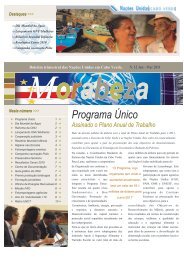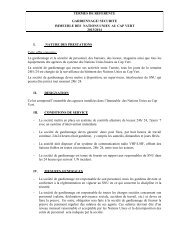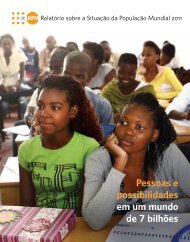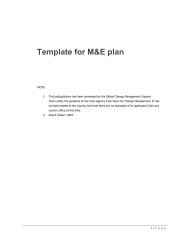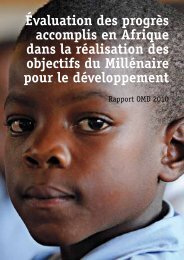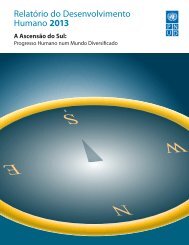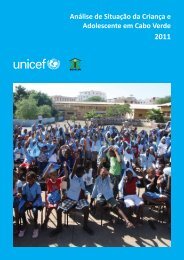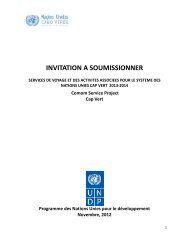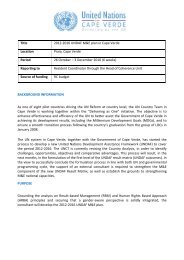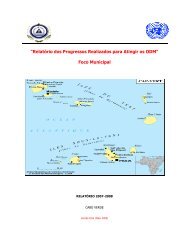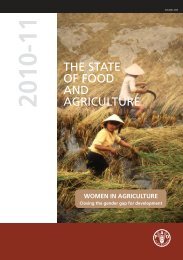Adolescence
Adolescence
Adolescence
- No tags were found...
You also want an ePaper? Increase the reach of your titles
YUMPU automatically turns print PDFs into web optimized ePapers that Google loves.
PERSPECTIVEThe effects of climate change in Kiribati:A tangible threat to adolescentsby His ExcellencyMr. Anote Tong,President of theRepublic of Kiribati“ Climate changeis eating away[adolescents’]future andputting theirphysicaland mentaldevelopmentat risk.”For adolescents in the Republic of Kiribati, climatechange is not up for debate – it is real and it ishappening now. Our young people feel its impactwhenever high tides flood their houses; they tasteits effects as their drinking water becomes salty.Rising sea levels, which have already brought poolsof brackish water to the doorsteps of many homes,are consuming our tiny islets, contaminating our vegetablegardens and poisoning our freshwater wells.Kiribati is a Pacific island country with a total landarea of 811 square kilometres. We have 33 atolls andreef islands, which are home to over 97,000 people –nearly half of whom are children. Global warming willchange the lives of our young people in more waysthan we can imagine. In 30 to 40 years, their nation,their home may no longer be habitable – it may noteven exist. It is time to face facts. We need to actswiftly and decisively to minimize the adverse impactthat climate change is having and will continue tohave on Kiribati.Global warming destroys our ability to grow the varietyof foods required to provide our children with abalanced and nutritious diet. Resources are divertedaway from their education and health as expensesto maintain basic infrastructure increase due to theencroaching sea. Climate change is eating away theirfuture and putting their physical and mental developmentat risk. Failure to react to climate change nowwill result in high cultural, social and financial costs.For low-lying countries, such as Kiribati, which are atthe frontline of climate change, the threat it poses isreal and immediate. The economic disruption couldbe catastrophic, even requiring the population torelocate to other countries.While the Convention on the Rights of the Child – theonly United Nations Convention to have been ratifiedby every independent Pacific island country – doesnot explicitly mention the right to be protected fromnatural disaster, climate change directly affectschildren’s right to life, survival and development. Asthe Convention states, every child has the right to astandard of living adequate for her or his physical,mental, spiritual, moral and social development. Ourchildren’s right to preserve their identity, includingtheir nationality, and their right to the enjoyment ofthe highest attainable standard of health are beingthreatened. Climate change also jeopardizes thesustainable development agenda established bythe Millennium Development Goals.When I speak with teenagers in Kiribati aboutglobal warming and its effects, it is clear that theirknowledge of the issue varies significantly dependingon where they live. For those who live in remoteatolls, limited access to information may lead toconfusion and anxiety. We cannot afford this. Weneed to ensure that every child and adolescent inKiribati is provided with the means to partake in thisvital debate. Investing in information communicationtechnology across the country will enable us to teach,learn and share information on climate change andits related issues much more quickly. As the onesfacing the brunt of this global challenge, our childrenand adolescents must be at the forefront of tacklingthe problem. Adolescents in particular are often quickto grasp problems and apply great energy and enthusiasmto finding solutions. They are our future andthey need to be empowered to take action.This year, we celebrated 31 years of independence.It is my fervent hope that our children, grandchildrenand future generations will be able to celebrate manymore years of independence in Kiribati. As a smallisland developing state (SIDS), we cannot afford theneeded investments or solve the issue alone. This isa call to action for families, communities and governmentsof developed nations to partner with us as wework to give our children and adolescents a chanceto have a future. Let us re-examine the impact on ourshared environment of what we are all doing rightnow and determine how we can collectively tacklethe challenges of climate change together with ourchildren and adolescents. Let us begin today.Mr. Anote Tong, President of the Republic of Kiribatisince July 2003, is serving his second term. He holdsa Master of Science degree from the London School ofEconomics. His professional experience includes workat the University of the South Pacific and the PacificIslands Forum Secretariat, as well as senior civil servicepositions in the Government of the Republic of Kiribatibefore he went into politics in 1994. From 1994 to 1996,he was the Minister of Natural Resources Development.GLobal challenges for adolescents 47



